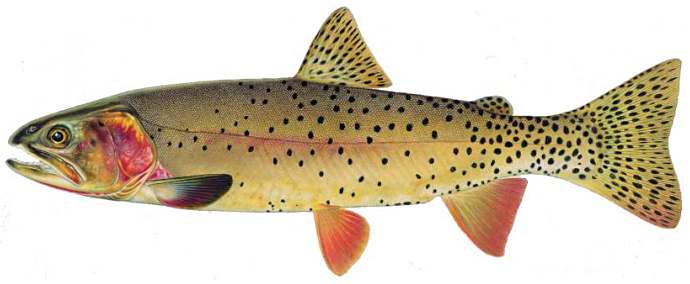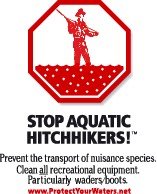FIX GOD'S MISTAKE
he overlooked the best waters
.. While pondering the upcoming road closures and delays in Yellowstone National Park, we were struck with the thought that it's not such a catastrophe after all. For, indeed, the upper Gibbon River was devoid of trout prior to our introducing  them.
them... In fact, the majority of the park's "fishing streams" were devoid of trout. This fact saddened the commercial and sporting interests of the day, (much as it gladdens those same hearts today.)
.. After all the pristine waters were full of bugs and crustaceans and pools and runs and riffles and such. They cried out to the Victorian Anglophile for 'SPORT.'
.. The informed wisdom of the day decided that enough was known about the world that planting a few bass would do no harm. They planted trout too. We suffer from the same fallacious thoughts today; knows-it-all that we are.
.. The history of fish planting in Yellowstone National Park is fairly well told. It is, sadly, poorly known.
.. The libraries are full of the references, and now the Internet is beginning to blossom with references. Not just titles and excerpts, but complete works are now becoming available. It's coming along slowly but, like the grinding wheels of the gods, exceedingly well.
.. Very few people
 consider the extensive invasive fish populations as despoliation. Certainly not the feather merchants of the gateway towns. Of course fly fishers don't even think that far.
consider the extensive invasive fish populations as despoliation. Certainly not the feather merchants of the gateway towns. Of course fly fishers don't even think that far... Most visitors to Yellowstone love the idea that there are fish; most of them don't fish. It probably stems from the fact that aquatic flies and crustaceans and native fish have few friends.
.. It may stem from the common misconception that rivers are just water and not dynamic ecological wonderlands in, and of, themselves. It may just be that we don't really care about natural processes and that we feel that what ever we muck up is just fine.
.. That certainly was the case in 1890. It is seemingly the case today.
 Who, we do wonder, would even advocate that the native aquafauna be restored?
Who, we do wonder, would even advocate that the native aquafauna be restored?.. It would seem that only the wolf and the bison have real friends. Fisher folks certainly are no friend of the native aquafauna of Yellowstone. We just catch 'em and release 'em - woot woot! Better to catch invasive fish than no fish.
.. Imagine the Gibbon River and the Firehole River, (above their respective falls,) devoid of trout. What wonderful biological laboratories they would be: aquatic life forms in their native habitat without the predation of invasive species like trout. Who knows what wonders could have been discovered?
.. As we watch the disappearance of the Yellowstone Cutthroat in Yellowstone Lake we can only dream about what the cutthroat fishery would have been today without the monster char that is feasting on the indigenous fish.
.. As we watch the disappearance of the cutthroat in Slough Creek we can only imagine with fond reverie what glorious specimens there could still be, had not the religion of catch and release allowed the rainbows to breed the natives out of existence.
.. We have gone so far as to enshrine the Lake Fish Hatchery on the National Register of Historic Places.
 Egad, what amazing harm that institution did to the indigenous population of native fish.
Egad, what amazing harm that institution did to the indigenous population of native fish.-------
.. For those interested in the way we planted fish in Yellowstone and the rationale that supported the despoliation of the rivers, the references below are worth the reading... For those who would rather fish the artificial fisheries of Yellowstone - woot woot!
--> FLY FISHING IN WONDERLAND (Yellowstone National Park), KLAHOWYA, Copyright, 1910 By O.P. Barnes
--> THE FISHES OF THE YELLOWSTONE NATIONAL PARK, By W. C KENDALL, Assistant, United States Bureau of Fisheries, APPENDIX VIII TO THE REPORT OF THE U. S. COMMISSIONER OF FISHERIES FOR 1914; Bureau of Fisheries Document No. 818, WASHINGTON, GOVERNMENT PRINTING OFFICE 1915
--> FISHES OF THE YELLOWSTONE NATIONAL PARK - With Description of the Park Waters and Notes on Fishing, By Hugh M. Smith and William C. Kendall, APPENDIX III TO THE REPORT OF THE U. S. COMMISSIONER OF FISHERIES FOR 1921
--> Trout Shangri-La, Remaking the Fishing in Yellowstone National Park. by John Byorth, From Montana: The Magazine of Western History, #52 (Summer 2002), 38-47.
--> For a contemporary, (Woot Woot,) point of view you should check out what Wikipedia allows to be printed: "Yellowstone National Park and its rivers and lakes has always been a mecca for serious fisherman, especially fly fisherman."
..Gazooks - "always" is a long long time, and certainly extends past the introduction of invasive trout to say nothing of the 'always' before the explosive beginnings of the current landscape. And, "serious"? Perhaps it is just unthinking or uninformed fishermen in this reference. This stub appears all over the Internet and is becoming gospel. Woot Woot Woot!
--> And for the broader perspective of how fishing attracts "spenders" to the park check out: A History of Concession Development in Yellowstone National Park, 1872 to 1966, By Mary Shivers Culpin, National Park Service, Yellowstone Center for Resources, Yellowstone National Park, Wyoming: YCR-CR-2003-01, 2003
.. Of course the unasked question looms large. "Do you love Yellowstone National Park or just the artificial fishing opportunities within it's despoiled rivers?"
-------
OTHER STUFF
.. HB 190, passed second reading concurred with amendments: vote = 93 - 6. Third reading today . . . . . CHECK HERE.OTHER STUFF
.. SB 15, probably dead; missed deadline for general bill transmittal. Walleyes never came to a vote in committee.
.. Marginally related: A new, unlinked, USGS page that purports to answer questions about the bulge in Yellowstone Lake, and includes a map from an 'in-press' publication showing faults and hydrogeology. A couple of the links are broken, and there seems to be a "new" Biscuit Basin, but it's worth a visit. We are awaiting the risk assessment.





.jpg)




